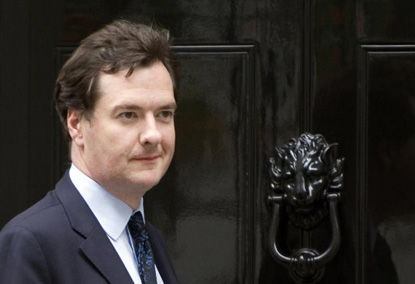By Richard Johnstone in London and Keith Aitken in Edinburgh | 9 November 2011
Chancellor George Osborne should take measures to kick-start growth while maintaining the government’s deficit reduction plan when he makes his Autumn Statement later this month, according to the CBI.

Rejecting Labour’s calls for an economic ‘Plan B’, the business lobby urged Osborne to ensure a credible deficit plan protects the UK’s triple-A credit rating.
The group instead pressed for a ‘Plan A plus’ to unlock private sector investment, create jobs and tackle economic ‘road blocks’ on issues such as planning.
It also urged Osborne to make it easier for small and medium-sized enterprises to access finance and introduce some tolls to fund road improvements.
CBI director general John Cridland said: ‘We are highlighting ways that the government can boost the economy, at little extra cost to the Exchequer. We also urge the chancellor to protect our energy-intensive industries, tackle youth unemployment and unfreeze the housing market.
‘This package of measures taken together could make a real difference to the economy, creating jobs and boosting growth in the years ahead.’
The CBI also today revised down its growth forecast for the UK economy. It now expects gross domestic product to rise by 0.9% in 2011 and 1.2% in 2012, down from 1.3% and 2.2% respectively predicted in August. The 2011 estimate had already been downgraded from 1.7% predicted in May.
The CBI’s chief economic adviser, Ian McCafferty, said that the turbulence in the eurozone had ‘seriously dented business confidence’ and increased the risk of a double-dip recession.
The CBI expects no growth between October and December this year.
‘Survey evidence points to economic growth having stalled in coming months, resulting in a significantly weaker outlook for the year ahead. We expect UK GDP growth to be flat in the fourth quarter and rise only very slightly in the first quarter of 2012,’ McCafferty said.
Meanwhile Scottish Finance Secretary John Swinney has stepped up demands on the UK Treasury for an economic ‘Plan McB’, after Scotland’s leading economic modellers halved their Scottish growth forecast and warned of a potential return to recession.
‘The UK government must deliver real action in areas where Scottish government action is making a difference: increased capital expenditure, improved access to finance for medium and small-sized businesses, and the introduction of measures to boost economic confidence and income security,’ Swinney said.
He was responding to the latest Quarterly Commentary from Strathclyde University’s Fraser of Allander Institute, which dramatically lowered its Scottish growth forecasts from 0.8% three months ago to 0.4% for 2011, from 1.5 to 0.9% for next year and from 1.9 to 1.6% for 2013.
‘We consider that the demand for Scottish goods and services, both currently and in the near term, has weakened since we published the last Commentary in June,’ the institute said.
Commentary editor Professor Brian Ashcroft warned that Scotland could yet dip back into recession unless measures were taken to stimulate growth: ‘Our central forecast is for growth to continue, just,’ he said. ‘But the avoidance of recession as the crisis in the eurozone deteriorates is becoming less and less likely.
‘It is a tragedy that the eurozone crisis, which threatens the wellbeing of the whole global economy, is worsening when clear policy solutions exist. That they are not being adopted is due to national hubris and policy error on a grand scale.’
Little in the detailed calculations relieves the gloom. The Commentary warns that unemployment could rise from 212,000 to 235,000 next year. It is currently lower than in the UK as a whole – 7.9% compared with 8.1% – but Ashcroft says this masks a tendency towards part-time working in Scotland.
While construction and manufacturing output have held up relatively well, the dominant service sector has slumped. The one-time growth engine of financial and business services is down by 11% on pre-recession levels, compared with 7% for the UK.




















